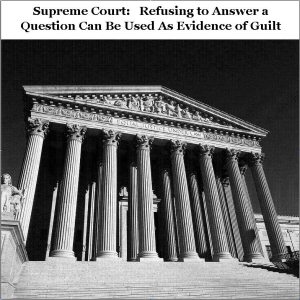The Right to Remain Silent?
Posted by bodhipunk
While everyone has been talking about Edward Snowden and the recent NSA scandal, there has been yet another attack on the right to free speech and the fifth amendment within the United States. The Supreme Court has ruled that when a suspect doesn’t answer a question prior to one’s Miranda rights being read, it can be used as evidence in court to demonstrate guilt. Prosecutors can use a person’s silence against them if it comes before he’s told of his right to remain silent.
The 5-4 ruling came in the case of Genovevo Salinas, who was convicted of a 1992 murder. Salinas was willing to answer some of the questions, but he refrained from answering others. For example, he remained silent when questioned about the murder weapon. Prosecutors in Texas used his silence on that specific question as evidence when convicting him of murder, saying that it helped demonstrate his guilt. Texas courts as well as the Supreme Court upheld the decision to allow silence to be used as evidence.
 The Fifth Amendment (Amendment V) to the United States Constitution, which is part of the Bill of Rights, protects Americans against coerced self-incrimination, with the Supreme Court saying that prosecutors cannot comment on a defendant’s refusal to testify at trial. The courts have expanded this right to answering questions while in police custody, with police required to inform those under arrest that they have a right to remain silent without it being used in court.
The Fifth Amendment (Amendment V) to the United States Constitution, which is part of the Bill of Rights, protects Americans against coerced self-incrimination, with the Supreme Court saying that prosecutors cannot comment on a defendant’s refusal to testify at trial. The courts have expanded this right to answering questions while in police custody, with police required to inform those under arrest that they have a right to remain silent without it being used in court.
Prosecutors argued that since Salinas was willing to answer some questions, he was thus not invoking his right to silence. Therefore, since he wasn’t under arrest and wasn’t obliged to speak, his silence on the incriminating question is not under constitutional protection.
Justice Samuel Alito stated that Salinas’ “Fifth Amendment claim fails because he did not expressly invoke the privilege against self-incrimination in response to the officer’s question, and that “[i]t has long been settled that the privilege ‘generally is not self-executing’ and that a witness who desires its protection ‘must claim it.'”
This Supreme Court decision was split down its conservative and liberal lines, with Alito’s judgment joined by Chief Justice John Roberts and Justices Anthony Kennedy, Clarence Thomas and Antonin Scalia. Justices Stephen Breyer, Ruth Bader Ginsburg, Sonia Sotomayor and Elena Kagan dissented. “In my view the Fifth Amendment here prohibits the prosecution from commenting on the petitioner’s silence in response to police questioning,” Justice Stephen Breyer said.
The police decided to charge Genovevo Salinas after one of his friends informed them that he had confessed, but Salinas successfully evaded the police for years. He was finally arrested in 2007, however, his first trial ended in a mistrial. It was during his second trial that prosecutors tried very aggressively to use his silence about the shotgun in their closing remarks to the jury.
Salinas was sentenced to 20 years in prison. The Texas Court of Appeals and the Texas Court of Criminal Appeals upheld the conviction, with the latter court saying “pre-arrest, pre-Miranda silence is not protected by the Fifth Amendment right against self-incrimination, and that prosecutors may comment on such silence regardless of whether a defendant testifies.”
The case, which was upheld by the Supreme Court, is Salinas v. Texas, 12-246.
Posted on 06/23/2013, in court, law, politics, stories, supreme court and tagged america, court, fifth amendment, free speech, laws, miranda rights, supreme court, usa. Bookmark the permalink. Leave a comment.



Leave a comment
Comments 0